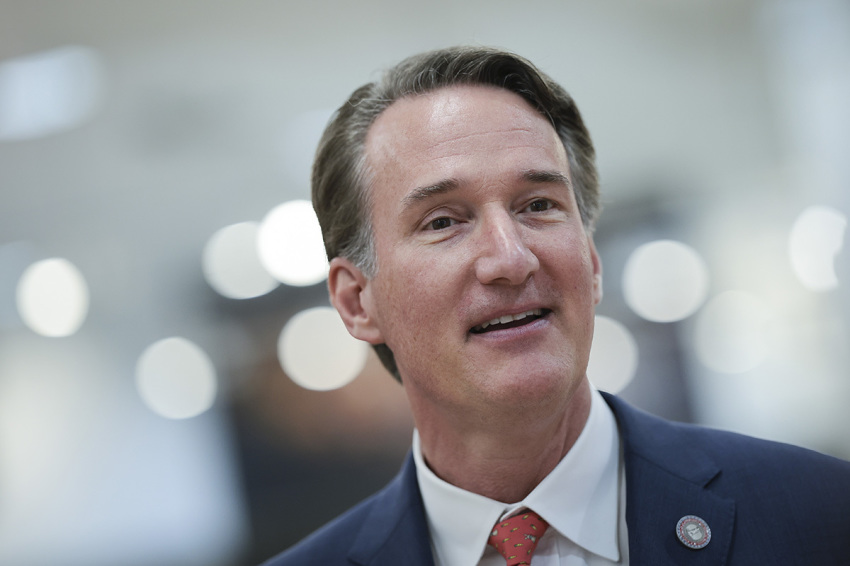Gov. Youngkin defends Virginia's 'common sense' law removing non-citizens from voter rolls

Virginia’s Republican Gov. Glenn Youngkin is defending his state's actions to remove non-citizens from voter rolls as the state finds itself in the crosshairs of the Department of Justice.
Youngkin appeared on “Fox News Sunday” to discuss the DOJ’s lawsuit against his state. In the complaint, filed in the U.S. District Court for the Eastern District of Virginia on Oct. 11, the DOJ under the Biden administration has argued that the state violated the National Voter Registration Act of 1993.
According to the suit, the law requires “states to complete systematic programs intended to remove the names of individual voters from registration lists based on failure to meet initial eligibility requirements by no later than 90 days before federal elections.” It cited an executive order signed by Youngkin 90 days before the November election directing the state’s Commissioner of Elections to “certify” the presence of procedures to provide “Daily Updates to the Voter List.”
“The ‘Daily Updates’ include [r]emov[ing] individuals who are unable to verify that they are citizens to the Department of Motor Vehicles from the statewide voter registration list,” the DOJ added. “The ‘Daily Update’ also included compar[ing] the list of individuals who have been identified as non-citizens to the list of existing registered voters.”
The DOJ lists “citizenship” as one of several “initial eligibility requirements” covered by the National Voter Registration Act of 1993 and thereby maintains that the state is prohibited by law from engaging in “systematic programs” to eliminate non-citizens from the voter rolls within 90 days of the election.
The lawsuit contains examples of Virginia counties removing voters determined to be ineligible from the voter rolls within 90 days of the election, as well as instances where citizens were marked as non-citizens and removed from the voter rolls. For his part, Youngkin vehemently pushed back against the allegations in the suit during his appearance on “Fox News Sunday.”
“This is not a purge,” he said. “This is based on a law that was signed into effect in 2006 by then-Democrat Gov. Tim Kaine.”
The governor described how the law engages in an “individualized” process that is “not systematic” where non-citizens, as self-identified during visits to the state’s Department of Motor Vehicles, who somehow manage to make it onto the voter rolls are given “14 days to affirm they are a citizen and if they don’t, they come off the voter rolls.”
Youngkin stressed that individuals affected by the law still have the option of same-day voter registration and casting a provisional ballot.
“To describe this as something that’s a purge is completely inaccurate. It’s wholly consistent with the U.S. Constitution, the Virginia Constitution and Virginia law,” he insisted.
After recalling how the DOJ under the Bush administration found that the law did not violate the Constitution, Youngkin suggested that political considerations motivated the DOJ’s recent suit, noting that the complaint was filed 25 days before the presidential election.
Youngkin added: “It’s been in effect for 18 years. It’s been applied universally by Republican and Democratic governors and now all of a sudden, when Virginia’s getting tight, it launches a lawsuit against the Commonwealth of Virginia when we are trying to make sure that citizens vote, not non-citizens.”
Youngkin rejected the notion that the sole motivation for the DOJ's suit was the enforcement of the law within 90 days of the election: “It had been used within the 90-day quiet period, most recently by Democrat Gov. Terry McAuliffe and Ralph Northam, and they said nothing.”
“How can we, as a nation, and how can I, as a governor, allow non-citizens to be on the voter roll?” he asked. “This is just not right. It’s not just constitutionally correct, it’s common sense.”
“Elections in the United States should be decided by citizens, Younkin added, “non-citizens just shouldn’t be on the voter rolls.”
Vowing that “we’re going to make sure that elections in Virginia are fair and accurate and safe,” Youngkin outlined some of the efforts his state has taken to ensure this goal: “We have paper ballots. We have counting machines, not voting machines.”
With two weeks to go until Election Day, the RealClearPolitics average of polls taken in Virginia since Sept. 3 show Vice President Kamala Harris beating former President Donald Trump by 6.4 percentage points. While this would constitute an improvement for the Republican nominee who lost to President Joe Biden by 10.1 percentage points in the 2020 election, the polling still suggests that the Democratic nominee is favored.
The DOJ’s litigation over removing non-citizens from voter rolls also extends to a state unlikely to be competitive in the presidential election: Alabama.
The Biden administration filed a lawsuit against the state in the U.S. District Court for the Northern District of Alabama last month, taking issue with Republican Secretary of State Wes Allen’s Aug. 13 announcement that his office had implemented a process to remove individuals with “noncitizen identification numbers” from Alabama’s voter rolls.
Allen’s announcement came within 90 days of the 2024 election. Last week, a federal judge sided with the Biden administration by issuing an order requiring the cessation of the program. Alabama supported Trump by 25.4 percentage points in 2020 and is expected to favor the Republican nominee by a similar margin this year.
Ryan Foley is a reporter for The Christian Post. He can be reached at: ryan.foley@christianpost.com

























